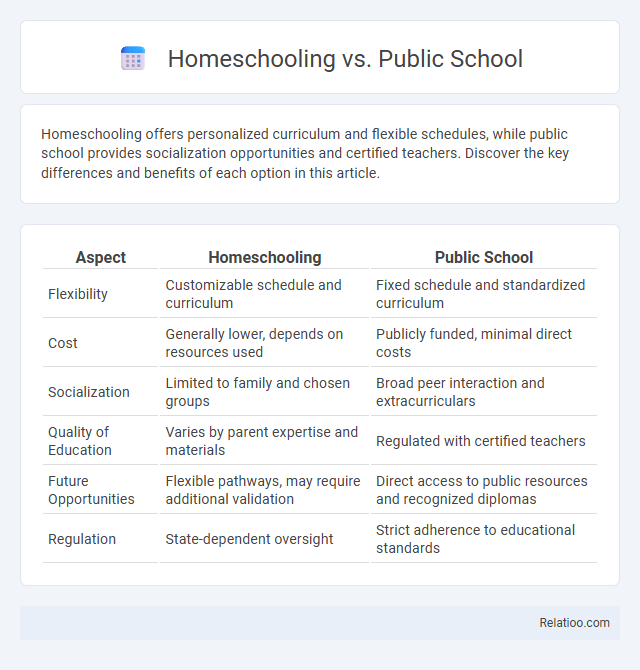Homeschooling offers personalized curriculum and flexible schedules, while public school provides socialization opportunities and certified teachers. Discover the key differences and benefits of each option in this article.
Table of Comparison
| Aspect | Homeschooling | Public School |
|---|---|---|
| Flexibility | Customizable schedule and curriculum | Fixed schedule and standardized curriculum |
| Cost | Generally lower, depends on resources used | Publicly funded, minimal direct costs |
| Socialization | Limited to family and chosen groups | Broad peer interaction and extracurriculars |
| Quality of Education | Varies by parent expertise and materials | Regulated with certified teachers |
| Future Opportunities | Flexible pathways, may require additional validation | Direct access to public resources and recognized diplomas |
| Regulation | State-dependent oversight | Strict adherence to educational standards |
Introduction to Homeschooling and Public School
Homeschooling allows parents to tailor educational content and pacing to their child's unique learning style, fostering personalized development and close family involvement. Public school provides standardized curricula, diverse social interactions, and certified teachers, ensuring broad educational exposure and compliance with state regulations. Both approaches present distinct benefits and challenges, influencing parenting roles and decisions in shaping a child's academic journey.
Academic Performance Comparison
Academic performance in homeschooling often exceeds that of public school students, with studies showing higher standardized test scores and improved mastery of core subjects due to personalized learning. Public schools provide structured curricula and social interaction but may struggle to address individual learning paces, potentially impacting your child's academic progress. Effective parenting supports academic success across all environments by fostering motivation, discipline, and engagement in your child's education.
Socialization Differences
Socialization in homeschooling often involves more tailored, diverse interactions through community groups, extracurricular activities, and family environments, allowing Your child to develop strong, individualized social skills. Public schools provide structured social environments with daily peer interaction, promoting teamwork, conflict resolution, and exposure to diverse perspectives. Parenting in each setting plays a crucial role in guiding social development, with intentional efforts needed to balance academic and social growth unique to homeschooling and public schooling contexts.
Curriculum Flexibility
Homeschooling offers unparalleled curriculum flexibility, allowing parents to tailor educational content to their child's learning style, pace, and interests. Public schools follow state-mandated curricula, limiting customization but ensuring standardized education and socialization opportunities. Parenting plays a crucial role in all settings by supporting academic growth and adapting learning strategies based on individual developmental needs.
Learning Environment and Structure
Homeschooling offers a customizable learning environment tailored to Your child's pace and interests, fostering individualized attention and flexibility. Public schools provide structured curricula with certified educators and diverse social interactions, promoting standardized learning experiences. Parenting plays a crucial role in supporting learning by creating a nurturing atmosphere and establishing consistent routines that complement educational settings.
Parental Involvement and Responsibility
Parental involvement in homeschooling requires you to take full responsibility for your child's education, ensuring tailored curriculum choices and direct supervision of learning progress. Public schools rely on professional educators, but active parental engagement in homework and school activities significantly enhances student success. The balance of parenting, education, and supervision responsibilities varies widely, with homeschooling demanding the highest level of parental commitment compared to public school settings.
Cost and Resource Considerations
Homeschooling often requires families to invest in curricula, teaching materials, and extracurricular resources, which can lead to varying costs depending on the chosen programs. Public schools are funded by taxes, providing free access to standardized education and facilities, yet some resources like tutoring or advanced classes may incur additional fees. Your decision should weigh the affordability and availability of educational tools alongside the potential need for parental time and involvement in homeschooling.
Extracurricular Opportunities
Extracurricular opportunities in public schools typically include diverse sports, arts, and academic clubs due to larger student populations and structured funding. Homeschooling offers flexibility to customize activities like community sports, music lessons, or specialized classes but may require more parental effort to access group experiences. Parenting plays a crucial role in facilitating extracurricular involvement by balancing encouragement, transportation, and budget considerations to enrich a child's development outside the classroom.
Individualized Learning Approaches
Individualized learning approaches in homeschooling allow tailored curricula that adapt to a child's unique strengths, interests, and pace, fostering deeper comprehension and engagement. Public schools strive to differentiate instruction using technology, special education services, and varied teaching methods but must balance this with standardized curricula and larger class sizes. Parenting influences both settings by supporting personalized learning through encouragement, resource provision, and advocacy for specific educational needs, enhancing overall child development.
Long-Term Outcomes and Success
Long-term outcomes indicate that homeschooling often leads to higher academic achievement and stronger critical thinking skills compared to public schooling, with personalized learning environments fostering independent success. Public schools provide diverse socialization opportunities that can enhance collaboration and adaptability in adulthood, while parenting styles significantly influence both academic motivation and emotional resilience across educational settings. Studies show that engaged parenting combined with tailored education--whether homeschool or public school--results in the most balanced development and career success over time.

Infographic: Homeschooling vs Public School
 relatioo.com
relatioo.com